In Favor of Cultural Christianity, or the Story of Josh Chris
The Holy Blueprints, Contra ACX on “Cultural Christianity,” and WTF was the Peterson vs. Dawkins Podcast?
In the beginning the job site was dark as shit. All was empty, void, and there were neither tools nor building supplies. The Head Honcho, the Constructor of Creation, the Contractor who Contracts Himself, walked across the endless Dark and placed His finger upon the Celestial Extension Cord and said:
“Everyone get to work.”
And there was Power and Light.
Thus was the beginning and ending of the first shift.
On the second shift, the Builder of the Building Blocks of the Universe, drove pilings upon the job site. And when He was done He gently stamped His foot upon the ground and said: “That Will Hold.” And so was the land risen to separate sea from sea.
Thus was the beginning and the ending of the second shift.
On the third shift, the Burner and Bloomer of Bushes placed Landscaping upon the job site and set forth the trees to rise on the land and the algae to bloom in the ponds and all the local flora and fauna to dwell in its place. And He said: “So be it that all who follow should use local landscaping features, for if they do not the maintenance shall be greatly increased.”
Thus was the beginning and the ending of the third shift.

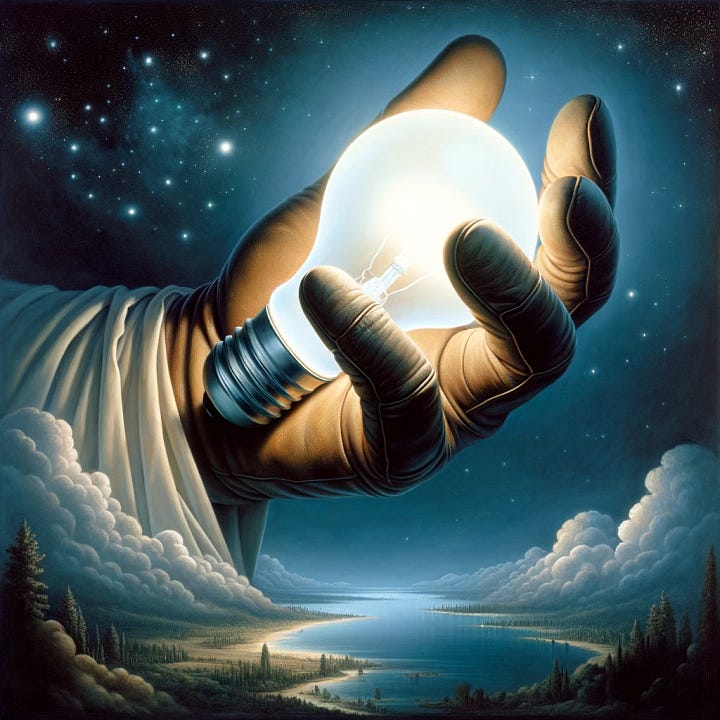
On the fourth shift, He who Ignites the Furnace of Heaven, screwed a heat bulb into the sky to bring permanent lighting and heating to the job site and called it the Sun. And a second cool-tone bulb He screwed into the sky of the evening and called it the Moon. And in this way, lighting and HVAC work was completed on the job site.
Thus was the beginning and the ending of the fourth shift.
On the fifth shift, the Eccentric One, the Producer of Peacocks, Peanuts, and Persimmons, placed living features onto the job site to catch the interest of all who might visit. Forged from scrap material to save on costs, He built each of the various kinds depending what was left over in their local environment so that each would be fit and of a piece with where it dwelled.
Thus was the beginning and the ending of the fifth shift.
On the sixth shift, the Head Honcho surveyed all that He had made and checked it against the job specifications. And with a knowing smile, He returned to the job site where His tools were kept and removed His gloves. He scooped up a handful of the sawdust which had been produced in the creation of the Universe and He breathed upon it. Thus He created the first Carpenter, Mike, and saw that he was good. And to Mike, the Head Honcho gave dominion over the Workshop and all its tools, but forbid him the Ladder that Led to the Blueprints of the Universe which contained the Sense that God Gave to a Horse and the Personal Protective Equipment of Eternal Life.
Thus was the beginning and the ending of the sixth shift.
And on the seventh shift, the Head Honcho completed His contract with Himself and went on vacation.
from The Blueprints: Foundations for Dummies, page 1-7, available at your local Home Depot
We all know what happened next. The Head Honcho saw that Mike was only one half of a crew. Another carpenter was needed in order that Mike should be able to lift long or awkward objects, or have someone to hold things in place for him while he tried to fasten them together. And so the Head Honcho reached into Mike’s tool belt, took out his tape measure, and created Midge to be the first Carpentress. For to women was given the gift of reckoning the hidden value of things.
Then, of course, Mike and Midge were tempted by the Safety Guy to climb the Ladder in the workshop and look upon the Head Honcho’s blueprints, and having done so they acquired the Sense that God Gave to a Horse. And realizing the danger of their work, they donned mundane Personal Protective Equipment just in case something should happen to go wrong. And finding them so attired, the Head Honcho asked, “Who told you that our working conditions were unsafe?”
This became known as the Long Fall off the Ladder.
So it was that Mike and Midge were laid off from the Heavenly Workshop and sent out to start their own construction venture. It was utter calamity. Forever after, work would only rarely be at waist-level on a workbench, tools would be forgotten or lost and need fetching and replacing, supply runs would be missing critical material, pants would fall down and reveal the crack in man’s ass where he had been broken in his fall from the Ladder, and all of Mike and Midge’s children would suffer from aches and pains. To this day, it is still utterly forbidden that a woman should ever climb a ladder and even those women who are never taught construction still have an instinctive aversion to it.
It got worse from there, when the Safety Guy tempted Bil, the first useless Brother in Law, to become a Safety Inspector. For in the first days, those who found building too difficult instead learned to create long lists of rules to impede the progress of those who wished to get things done. Rather than test themselves against the rules set forth by the Head Honcho, they created paper trading schemes where accomplishment could be measured against man’s lesser law. And so it was that Bil delivered the first safety citation unto Abel and needless regulation entered the world.
We will skip over innumerable stories, like how Mo attempted to negotiate a new union contract for the Masons in Egypt, but then had to walk off the job. We will skip entirely how Mo plumbed the Red Sea to escape the Egyptian Government Clients. Instead, we shall go right to our salvation. We arrive at the birth of the carpenter Josh Chris.
Josh was born in a humble barn remodel. His mother was Mare and his step-dad was the wood-worker, Joe. Amidst the unfinished work, with tools and materials strewn all over the floor, Josh entered the world. The Heads of Three Trade Unions, following a Carpenter’s square in the sky, came to do him honor. A heavenly angle, perhaps 22.5 degrees itself, also sent word to a team of field surveyors to come and pay homage. For it was written:
“For to us a carpenter is born, to us a step-son is given, and the government contracts will be on his shoulders. And he will be called Wonderful Woodworker, Mighty Mason, Everlasting Electrician, Prince of Pergo.”
Right away, it was obvious there was something different about Josh. It was as if he had been born knowing every form of joinery and cabinetry. Parallel and serial wiring were as nothing before him. When still a child, he invented the right angle in Egypt. It seemed that a heavenly work light followed him wherever he joined two boards together.
When Josh went to see his cousin Johnny the Pool Guy, who was doing un-permitted pool construction and renovation in the wilderness, to a be admitted into the union a bird appeared and for the first time didn’t empty its bowels on any concrete. That was how much respect Josh commanded. For, you see, Josh was truly the son of the Head Honcho. He had been sent to bring carpenters back to the ways of True Construction.
It soon came time that Josh had to leave his step-dad’s company, Joe & Sons,1 and strike out on his own. He gathered Twelve Tradesmen to himself and set out to perform many miracles and mighty feats of construction.
His first miracle came while attending the wedding of his cousin. Mare came to him in a panic and asked him to help. His cousin only had light beer and this was not appropriate ever to be drunk by a family of carpenters. Josh laid his hands upon it and it was soon transformed into Rainer, the greatest and most correct beer ever to be consumed by people who actually work for a living.
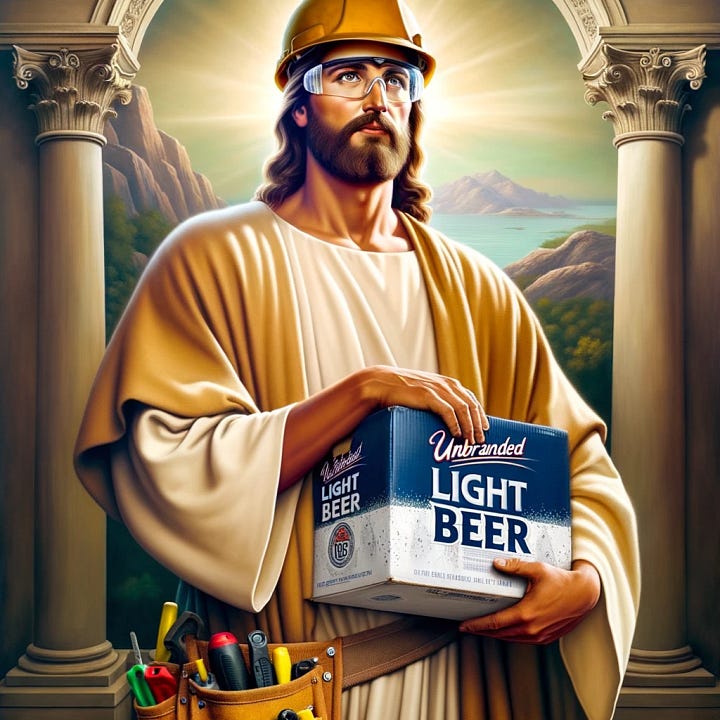
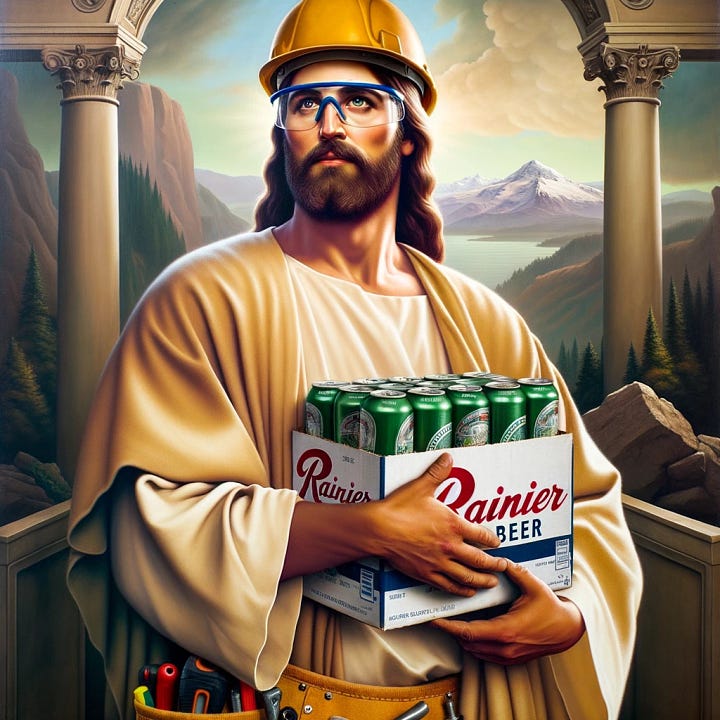
He performed amazing feats of chiropractic medicine, and healed hundreds of bad backs. He struck the cataracts of blind men with his hammer and restored them to sight.


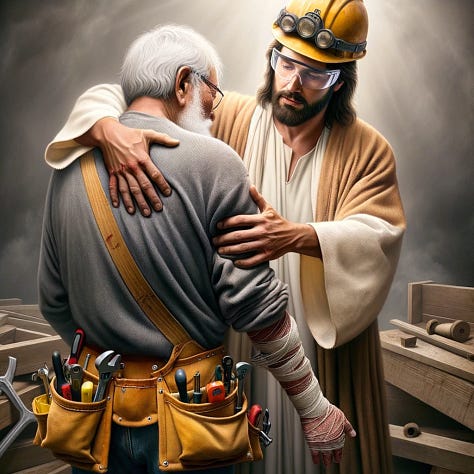



During a time of great need, when the Twelve Tradesmen had inadvertently left all of their tools on the other side of a great slab of wet cement and trapped themselves, Josh calmly walked over the slab and left no footprints.
But not everyone was happy with young carpenter. The Safety Guy soon appeared and shut down one of Josh’s work sites for forty days and forty nights with made-up citations. The Safety Guy told Josh that if he abandoned carpentry and pursued needless regulation instead, that all of the riches and kingdoms of the world would become his. Josh turned from the Safety Guy, climbed up a ladder to address all of the cited violations, and said: “Hold my ladder, Safety Guy. For who else will build these kingdoms if not I?”


Once, when many apprentice carpenters came to see Josh work and learn from him, they failed to bring supplies to the job site. Josh said not to worry and went to his miter saw, and mitered a board in half. And when he was done, Josh had not two boards of half the length… but two boards of the same length! Are he handed out hammers and instructed the apprentices to pull nails and for every nail they pulled they should find two in their nail pouch.
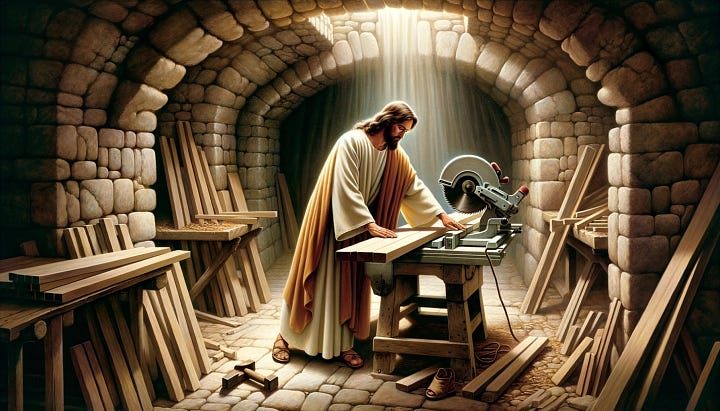

He told the world the story of the Good Electrician. A lowly mason had been attacked and abandoned on the side of the road. This mason had been passed by a framing crew, a drywall crew, a mudding crew, a painting crew, and even roofers. It was only the electrician, who the mason has previously dismissed as high and mighty due to his great wages, who stopped and helped the mason find a chiropractor.

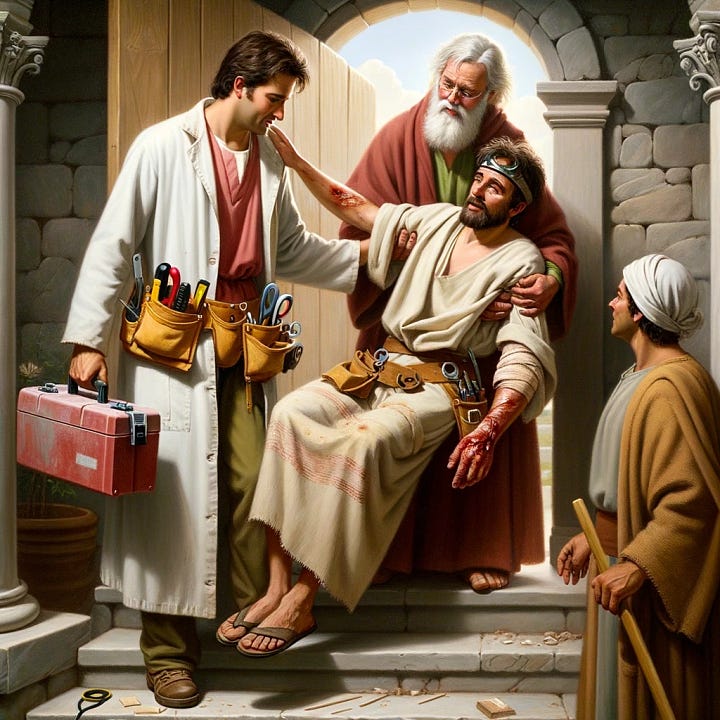
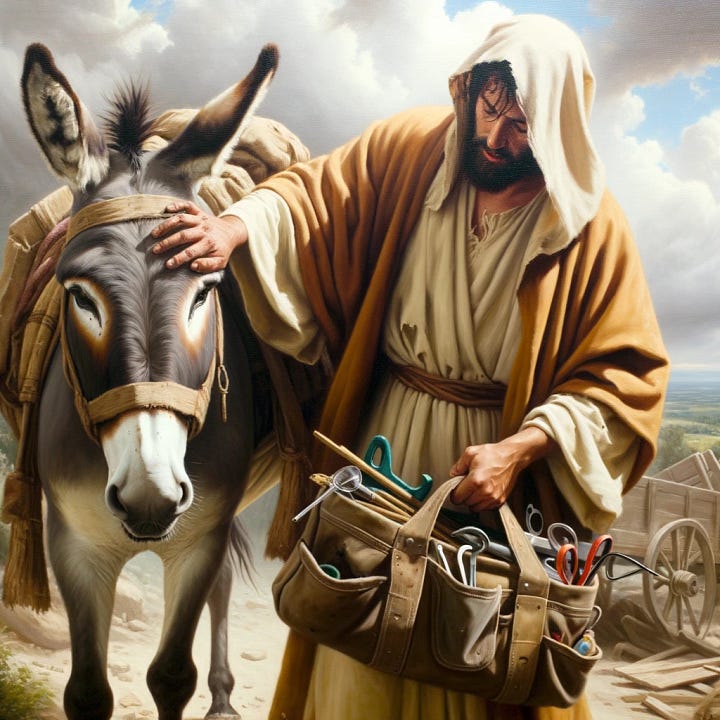

Then, Josh called the crew together at the Last Lunch-break and told them that his time on Earth would soon be over. For soon it would be time for the crew to go to the union hall for their next job and rehab a condemned house. This would bankrupt the entire business and cause Josh to become permanently disabled. But on the third day he would arise to start a new business. None of the Twelve Tradesmen knew what to say.
When he went to the Union Hall, Josh was dismayed to find that the place had been taken over by spreadsheet MBA’s who had never done a day of honest work in their entire lives. He took his hammer and smashed their laptops.
They union heads became furious with him for doing this and sent Josh, by himself for all the Twelve Tradesmen abandoned him, to repair a condemned house that no skill in construction could possibly make profitable. Josh faced certain ruin.
So jealous were the other union enforcers that they smashed Josh’s hands and took his tool belt from him and commanded him to repair the house in three days. Josh responded, “I will not only repair this house but the entire world.” The union thugs laughed at Josh.
Josh fastened himself new tools from the scrap material on the house and spent an exorbitant amount of money roofing the house, knowing that while doing so he would never recoup his investment in the supplies. He looked up to the sky and said, “Head Honcho, why have you condemned me?”
At last, a joist fell upon Josh and broke his back beyond the ability of a chiropractor to repair. He became permanently disabled. To this day, carpenters still say, “Josh on the Joist!” to express dismay. At the moment it struck his back, Josh saw that his work was completed and the house was fit for living. He said, “Love the customer as you love yourself, and you will always build truly and well. For only in this way can you be free of bullshit regulation.”
Josh was sent to live at home with Mare, broke and bedridden, like a common incel. A great gloom descended up on the house for all knew that not being able to build things would destroy Josh.
Three days after Josh had become Permanently Disabled, Mare from Magdala, a woman Josh had hired for his crew —for Josh had a suspiciously modern sensibility about gender equality for having lived two-thousand years ago— went to visit him and found that his bed was empty. His tool belt, hard hat, and safety glasses were left behind. His mother said Josh had retired from carpentry at thirty and had left to start a new business.
And to this day, nobody knows what happened to Josh after that.
Contra ACX on Cultural Christianity
The world is changed. I feel it in the water. I feel it in the earth. I smell it in the air. Much that once was is lost… for none now live who remember it.
Can you feel the click click click of the roller coaster making its way to the top of the rise? The sinking feeling of the inevitable ride we are about to take together as a culture? Millenials have aged and a generation has passed. The hearts and minds of Gen Z are up for grabs. That means it’s time to argue about God on the internet again.
I’m part of the problem. Rebuke me if you must. I care about your internal mental model of the universe and whether it contains a figure we can point at and meaningfully call, “God.” I think that it’s important for you personally, for the future, and for mankind in general.
I’m in the God camp.
Full disclosure for new readers, the reason I find this question unavoidably interesting is that I “saw” God in my late twenties. Yes, that’s weird. No, I don’t do drugs. No, I don’t think I have magical powers. Yes, I know it probably makes a large number of you unable to follow anything else I’m going to say without hyper-fixating on it. I was up to that point, and desperately for a few years afterward, an atheist. Then, eventually, my son was born and I could accept no other conclusion than that there is something deeply, profoundly inescapably good in the universe. That thing is, in most senses of the word, “alive” and that it cares about what happens to us. And at last, I owned up to the truth that even if that “being” didn’t say it was Jesus, I can’t imagine anything else it could have been and any attempt to do so on my part feels like weaseling out of responsibility. I have a duty to be honest.
This began as a response to this piece by Scott Alexander at Astral Codex Ten, but obviously has meaningfully morphed. Still, I’m going to try to address some of the specific points raised in the piece. Then I’ll weave this all back together at the end to make the first part fit into the whole. Give me some slack, and imagine we are back in the Workshop and that I am about to bring two carefully cut boards together in an act of emotional and cosmic joinery.
For those not up to speed, Ayaan Hirsi Ali, a world-famous atheist and long-time friend of Richard Dawkins has converted to Christianity. Score one for our boy Josh! Some sloppy language in a response by Dawkins has now raised the idea of “Cultural Christianity.” None of this was asserted by Dawkins,2 but I believe the term has now morphed in the public mind to mean: “Okay, what if I don’t buy into any of the specifics of the religion but just go along with it because it seems like it could be good for everyone and the completely secular worldview doesn’t seem to have worked out as hoped?”
There’s lots of ways this seems to be beneficial on a practical level. I’ll pick one. You hear people talk about the birth rate discourse, but did you know that one of the strongest predictors of how many children you’ll have is if you are religious? Whatever benefits secular society may have given the world, it appears that a reproductive polity is not one of them. Religious people have enough children to replace themselves and to grow their population. Secular people, as a group, do not.
This all leads to the question “Should I betray my own conscience and sense of rightness for social practicability?” as asked in the linked piece by Scott Alexander.
To which, I believe the only appropriate answer is, “no.” Followed by “but you should think it through and talk to other people and make sure that’s what you’d be doing if you joined a church or, I’m guessing, a synagogue, and on what terms that would be meaningful to you. Also, on the surface, it seems like going to a church or a synagogue a few times and just feeling it out doesn’t seem like one of those things that would totally destroy your internal moral order.”
The first several drafts of this essay contained what I considered to be clever arguments for the existence of God. I have since scrapped those in favor of the emotional and personal approach. Nobody in my intended audience for this needs to understand that in the argument between Free Will and Determinism the only real answer is compatbilism,3 or that the multiverse might answer a lot of questions about how God can be good even if bad things happen, or that for the universe to have been constructed otherwise would mean that none of us would exist.
When I was an atheist, I would only ever groan at the inability of the religious side of the debate to follow or to make scientific arguments. I found it incredibly frustrating, for instance, that the creationist Ken Ham didn’t know that if the Earth was only 6,000 years old that the radiological decay rates to make that be true would mean that just the decomposition of various isotopes of nickel would provide more than five times the required energy to melt the entire planet. If it helps the casual atheist reader, I know fun science facts like that the relative abundance of deuterium is 1 in 8,000 hydrogen atoms, that the universe is something like 13.8 billion years old, and I took enough computer science classes to know what Kolmogorov complexity is. None of that, in any meaningful way, really speaks to God as I understand Him except in the most roundabout ways. God, as I understand Him, is the fount of order and reason. A lot of that stuff now feels like sword-fighting in movies, meant to be flashy and impress a sense of cleverness, rather than speak to the humanity of the other side of the argument. I tended to “know” even as an atheist, at least the theme of any particular argument for God. The internet is deep and it already contains pretty much any argument you care to find, so if you are looking for one there are other places. I’ll probably write several in the future.
I’m writing this to a younger version of myself. The intended reader for this piece feels a hole in their heart not their mind, a lost sense of meaning, and I’ve come to think questions like “okay, but was the Virgin Mary literally a virgin?”4 are nothing more than rude and flashy distractions from the discomfort we all feel with being that vulnerable about our own needs. Even the defensive position of “No! My heart and my mind are in disunion! Both are fine on their own! There’s no hole in my heart!” I have come to see as another distraction.
I spent a long chunk of my life being quietly angry at a God that I did not believe in, except I called Him “the universe” and knew nothing except that I was too good for it. Whatever “this” all is, I felt that it had wronged me and that it was all irredeemably broken. Being angry at God is a perfectly natural state of existence. Wishing things were otherwise is likewise normal. There were all kinds of reasons to be furious with existence. I’m not the smartest person I know, but I do have the biggest parent/child IQ gap of anyone that I know. That alone made for an incredibly frustrating childhood. All I ever wanted to talk about was science and all my dad wanted to talk about was bowling. My mother is mentally ill and refuses treatment. She married a lunatic who made our lives hell. I was raped as a child. The first few decades of my life were filled with ugly choices that damaged me in ways that by the time I got to college, I couldn’t even want to succeed. I didn’t have the worst life of anyone I know by a long-shot, but I continue to have had the worst life of anyone else I know who eventually made it into the laptop class. All of this I say as a way of creating intimacy. I don’t find big clashy battles that use words like “owned” or “destroyed” to be at all interesting or helpful.
The Jesus I know isn’t the kind of God who laughs or says “dude, totally pwned!” and high fives you for making a zinger that makes someone else feel badly about themselves. The Jesus I know is the kind of God who listens, who cares, who never lies, and who firmly prods you so that whatever decision you make is a decision is you own with all the joy and responsibility that carries. And He’s the kind of God who wants me to do that for other people because otherwise I’ll catch a glimpse of myself in a mirror and know that I let Him down.
So, let’s say you’re an atheist but you feel the god-shaped hole. You can’t make yourself believe in God. It all sounds like nice nonsense at best, or at worst a thinly veiled excuse to do something really mean or terrible. Maybe, at my highest aspiration, all of this reads like a profane5 C.S. Lewis or Chesterton piece of “beautiful nonsense” but doesn’t speak to anything “real” in you. Will you indulge me a bit further and we can just play out the practicalities of you going to church? Or again, a synagogue, or whatever.
So, there you are. In the pews. Are you going to immediately experience a full Russian-literary-esque spiral of guilt, self-reproach, and self-flagellation because of the epic hypocrisy of wanting to try a social gathering on for size? This is the biggest point I wanted to talk about with this piece. You can just go through the motions and that’s it. It doesn’t have to be more involved than that. I’m sure there are places where it feels like being sold a timeshare and you get high pressure tactics. There are lots of bad churches. There are lots of bad priests. But you could also just show up to a decently well-attended Catholic mass on Sunday and leave immediately afterward if you want. If you’re finding that atheism isn’t working for you because it’s lonely, you’re totally allowed to go to church just because you wanted to see other people. Attend Easter and Christmas mass. Sing the songs. Tell yourself whatever you need to about it being an interesting experiment in cultural story-telling that you, personally, are far too intelligent to believe but that you indulge for personal reasons.
What’s the worst that could happen? What if, in the holy name of Isaac Newton, you became regularly involved in a group of socially minded people who live close to you? What do you think you’d find? I know there’s resistance even to imagining this. You’re telling yourself that you can’t ever do this because you don’t 100% sign off on everything the pastor or rabbi says. Well, I don’t think you’d find it works that way in real life. I know a lot of regular church-goers. Approximately 0% of them sign off on 100% of everything their pastor or rabbi says. Some of them sign off on quite a lot, and maybe more than they should, but none of them are down for everything. And that’s fine, because your pastor or rabbi isn’t God and he or she should be well aware of that whatever denomination they follow. And if the religious leader does see themselves as a god, you can leave immediately and save as many others as you can on the way out.
See? All to the good.
So, there you are, an atheist in sheep’s clothing. What if you did something really wild and disgusting like help feed the hungry or something? It’s something you totally would have been okay with anyway, except that if you’re like me, you can’t ever seem to do personal one-on-one charity work like this on your own. I’ve given money plenty of times. But pretty much all of the charity work I’ve ever done for specific people has been done in a religious context. My uncle Mike used to drag me around to do work for his church. The guy who had T-Rex style thalidomide baby arms didn’t care I was still an atheist when I built him a small deck and a handicap ramp for his paraplegic wife. You could do that, too.
But, you’re thinking, what if someone said something really unscientific? What if some person goes on and on about how evolution is fake? Or how DNA was invented by the devil? Well, you could just be honest and explain why that’s not true. You could bring a lot of scientific education to a group of people who, in this example, don’t have it. If they push back, you could even be honest that you’re not sure how it all reconciles with religion and that you’re pretty sure that there’s not a God but you’re coming to church for social reasons you have a hard time explicating. I bet there are a lot of spouses there in the same boat, where they’re going along with the flow but not sure if they believe any of it. My guess is that “Cultural Christianity” of this kind is about as old as Christianity itself.
What if the priest did something immoral and now it’s hard for you to do something about it because you have all of these social ties to the institution? I have to ask myself this a lot because of my own abuse history. This is in no way an abstract question for me. I was once an abused child, so what would I do if I came across an abused child that nobody is helping? When I ask myself this question, the answer is obvious. Let’s say the very worst happened and I became Catholic and I found out the priest was an abuser. What would I do?
I’d stop the abuse and help the kid. Immediately. Without fear of earthly authority or retribution. Without regard to social niceties, title, office, or personal charisma. I don’t care if you have a red sash, or are in some way famous, or if you have higher status than me, at least one person is going to jail. And if the priest isn’t lucky enough to be properly arrested by the civil authorities, well, then God help him because I won’t let that stand either. I owe a duty.
You just stopped a crime by going to a place where people were bad! That’s awesome!
Okay, that was dramatic. But you still have this hole in your heart. You’re going through the motions but how is this supposed to help you? After a while won’t all of this get boring and meaningless too?
Well, hopefully, you’ll meet people there. You’ll get to know them. You’ll make acquaintances and form friendships. You’ll go about the very complicated business of having to be involved with other human beings. You’ll become the science guy. You’ll be the one who stands up sometimes and is a stick in the mud about something not being ethical. Nobody will quite fit into box you want to set them in and you’ll have to wrestle daily with the very imperfect business of being decent to everyone. Some of the stuff about caring for other people will sink in even if you don’t believe it has a divine source. You’ll force interpretations of the source material that are in line with what you sincerely believe to be true.
My dearest hope for you, is that at some point you step back and see yourself immersed in a community that from a distance is all jostling together in a common direction. That common direction might just be called “living a life of care for one another.” And by doing that you’ll acquire a sort of lens by which to view the stories you previously dismissed from another angle. You might even go about the experiment of imagining you were God and your choice at the creation of the universe wasn’t “fix everything, make everyone happy” because to do so would destroy everything that makes everyone an individual. Your love of that messy little community might make you emotionally realize why that’s no choice a loving God could make at all. Instead, if might seem to you that this world with all its flaws is the world that allows your fussy little community to exist, and you might find immense gratitude to… well, call it the universe if you must. You might find immense gratitude to the universe for those specific people, instead of the hypothetical people they might have been if Josh had built the world otherwise.
The world is messy and it never stays still. Arguments that, “well, this thing eventually fell in popularity anyway so we can’t go back to it again” are a bit silly when that truth is recalled. What is popular is what people show up to do. Culture is the preferences you find that help the world continue to propagate. Not everything continues to propagate and fads rise and fall like the tides. We are forever pushing and pulling away from the things that will help us and we are forever pulled back to them because they’re the only things that work. What you show up to fight for today, that in turn helps you to win tomorrow, is the thing that rises back up to the top. The culture is never “done” or “settled” anymore than a species is “done evolving.” I don’t doubt that tomorrow’s religions might superficially feel different from those of yesterday. We know different things. We approach it from a new context. But if you step back and squint, I think they will be much the same. Perhaps there will be Space Catholics, Space Jews, and Space Muslims. But all of that is a way of saying Catholics, Jews, and Muslims… but in the future.
But just go, give it a try. See how it feels. Tell yourself it’s cultural if you need to. God forbid you have any actual deep needs that you require other people to satisfy. Certainly not. You’re much too strong for that.
Or, as Chesterton said:
“all conservatism is based upon the idea that if you leave things alone you leave them as they are. But you do not. If you leave a thing alone you leave it to a torrent of change. If you leave a white post alone it will soon be a black post. If you particularly want it to be white you must be always painting it again; that is, you must be always having a revolution. Briefly, if you want the old white post you must have a new white post.”
Dawkins vs Peterson
It’s very boorish to pretend one had a moral wisdom in previous years to cover for a deficit one has only recently amended. People deliberately misremember events all the time to put themselves on the side of the angels and it always makes me roll my eyes a bit. Yet I shall do it now and will have to rely on your good faith that it is not mere pretension. I have never more than tolerated Richard Dawkins, and I never understood the people who loved him. In my heart, there were only ever two horsemen of the New Atheists and their names were Hitchens and Dennett. I say this to wash away any sense you might have had from the previous section that I hold myself to be some sort of saint who is free from base emotion, or that I am never muttering “be patient, be kind, people were good to you when you didn’t deserve it” over and over to myself to stay on the righteous path.
Hitchens I loved for what I saw as his courage and care, even if I later came to disagree with many of his particular conclusions. You never doubted the man gave a damn about people when he’d stride out like a lion and start biting heads off.
Dennett, I loved because I feel I correctly pegged him as the most intellectually honest of the New Atheists. Where Harris too often veered into “this makes me feel badly and is mean to say to other people, therefore it is true” Dennett was much more careful and cautious when trying to stick facts together. I respected that, and I still do.
Dawkins, by contrast, always seemed to revel in being a dick. Something very much in the school of “I am right by virtue of I said something that humiliated you.”6 And I try to find ways to be more generous than that… but the man just never seemed curious to me, outside of his very niche field. Some of this may be biased by my own background, but basically I’ve always found mathematicians and physicists to be the most humble and approachable people in all of the sciences. Second, are chemists and material scientists who can be somewhat cold but are always honest and straightforward because they have nothing to prove. But biologists? Man. The descriptive sciences have a chip on their shoulders and while social sciences are usually full of people who make up flowery language to cover up for that, biology is close enough to the harder sciences it has a chip on its shoulder. Once you move away from the necessary honesty of mathematical and atomic mechanism people can become savage assholes. The rudest people I have ever met in my life were biologists.
So, there are my biases laid out on the table. Scientists who aren’t very good at math tend to be dicks because they’re self-conscious about it. And Dawkins fits that stereotype for me to perfection.
I listen to a lot of podcasts from my front pants pocket. I’m running around taking care of my children for quite a bit of the day on paternity leave and one can only watch Encanto so many times. I was fairly curious to listen to the Dawkins vs. Peterson debate and… man. I felt like a terrible father. My son isn’t even three yet and some of this ended up in his developing mind. It was two people talking past each other, making almost no attempt to sync up on the same page or to speak the same language. Like if you went to a rap battle and one guy was playing “Jesse’s Girl” and the other was playing a harpsichord and the whole idea of “rap battle” was left on some entirely different continent from this event.
Peterson did the whole thing where he talks entirely too much and uses too many words to say something simple.
Dawkins did the thing where he asked short close-ended questions that didn’t give his opponent any opportunity to fully express themselves, so that any points he scored were scored in bad faith. Followed by a total lack of effort to make any good faith attempt to understand anything Peterson was saying, although Peterson wasn’t of much help in that regard.
A short, close-ended question can be very helpful in certain contexts, but it has to be the right question, leading you on to a greater truth. This is a poetic distinction lost on Dawkins. Peterson, likewise, seemed eager to impress and abandoned any attempt to trim down his ideas to Dawkins’ specific background.
I recall Dawkins once asking Neil Degrasse Tyson a physics question about the expansion of the universe and a lightbulb went on over my head. He had literally never cared enough in his entire life to ask anyone a question about inflationary cosmology.7 This is the theory that contains, among other things, the idea that space-time itself rapidly expanded faster than the speed of light at the beginning of the early universe. This is why space appears to be flat rather than curved. It is a theory that is older than I am and at the time of event had been available for Dawkins to learn for a few decades. It wasn’t something that ever came up in the context of biology or something he could know to make someone else feel poorly, so he had been completely incurious.
If Dawkins asked me, “Do you believe Jesus died for our sins?”8 I would not do what Peterson did, which was try to play a whole philosophical game where I attempted to decode and translate, then expand what each of those things meant to a hostile listener.
I would simply quip, “What is the boiling point of a mother’s love for her child?” and put Dawkins on his back heel to explain to me the limits of abstraction as he understands them. You can put words together and add a question mark at the end. It doesn’t mean the question means anything. You can even put words together that mean something to someone who understands them. It doesn’t mean you understand them.
And probably after a few more hostile barbs, I’d sigh and ask Dawkins to tell me about his favorite work of art and why he loves it. And he’d do that thing he does where he tries to be above his own human experience and how he only cares about “eternal things” that would matter even if humans went away, which he lacks the imagination to understand also includes things like “humans” and “culture” and “art.” We didn’t cheat our way into the universe. We aren’t some separate branch of existence. We are a part of the whole thing. Kill us all with a meteorite and wait a while. Somewhere else out among the stars something close to us will pop back up.
If I may quote myself for a moment:
Imagine you went into a dimly lit attic with holes in the roof. You pick up a handful of dust and blow it toward those cracks in the ceiling. Suddenly, the specific source of illumination is revealed and you can see clear and distinct shafts of light coming through the roof as if the light was something substantial you could pick up and move. The sun is still hidden, but you know it must be there to give source to the light. So it is with words, I think, and meaning. Words and meaning come to us from some sun we cannot otherwise see and whatever it is that we say or write is only a bit of dust that makes clear the path of its light.
That abstraction exists at all and that we can understand anything is a kind of miracle. If it seems to easy to you, think on it harder. It baffled Einstein. It’s a common kind of miracle because we do it so much that we scarcely notice. From a certain perspective you might guess that it isn’t surprising. We predict the universe and we are made of the universe. The same laws bind both systems, because it is only artifice of thought that keeps the systems distinct.
There’s a certain kind of atheist who tries to go “all the way.” They deny the existence of the self, of experience, without realizing that it’s one of those transcendental things you can’t quite get rid of. Trying to get rid of experience just gives you the experience of trying to get rid of experience. Same thing with the elimination of the self. Would you believe there are people who don’t believe in math either? Who think things like “the number eight” are purely human inventions and that if we weren’t around there wouldn’t be such a thing as “the number eight?” This is the most Hardcore Atheist Fallacy thing of all.
Somehow, in some way, we stake out meaning in the universe. And the meanings we point to, well, they have to at least be partly true because you can use them to predict the future. Science, in other words. Real science, before science became people giving themselves pieces of self-congratulating paper, when you had to ask the universe a question, like an oracle.
I think Dawkins frustrates me most because he’s not an experimentalist. He’s not the roll up your sleeves and humiliate yourself before the universe kind of scientists.
What was missing from the debate was humility and a sense of connection to anything practical. That’s the face of God I struggle the most to know. I’m too up in my head too much of the time. God pulls me back and asks me to get my hands dirty.
God started as a builder. He kept a garden. When it came time to send his Son to live among us, He was a wood-worker. He was never above doing a job. Never above the plain, everyday, ordinary challenges of existence. It was in those simple things that He left Himself to be found.
I don’t like the part of myself that dislikes Richard Dawkins. I suppose I should be more unhappy than frustrated that the two men did not reach an accord that left Dawkins better off. I think Dawkins has done almost irreparable harm to a lot of people. If the religious reproductive numbers are right, and Dawkins successfully helped remove some large number of people from the church, then as the years have worn on many fewer children were born because of his influence. He might hear something like that and say “well, that doesn’t make me wrong” and I suppose as far as he goes, he’s right by his own measuring stick. But I think of the Nazarean, joining two boards together. Doing things to help people. Practical things. No job too small. Not above it all. Focused on the people around Him. What was His measuring stick? What was Josh’s tape measure, if not the well-being and love of those around him? In what way is that fake, if experience is the single most irreducible component of existence?
This is of course where we get the prayer:
Atta-boy, Joe, step-dad of Josh
Really good art thou among wood-workers and the best is your step-kid Josh
Joe, a lotta guys woulda walked out, but you didn’t.
Good job, buddy.
Dawkins position was more or less, “I was raised in a Christian society so I take some of the cultural traditions of Christianity as a given.”
There’s something I call the “Hardcore Atheist Fallacy” which goes something like “this makes me feel shitty and is mean to say to people, therefore it is true.” If you have spent meaningful time with the arguments, then compatibilism is the only meaningful answer that resolves the terms for Free Will and Determinism in ways that do not self-contradict. If you do not believe this *cough* Sam Harris *cough* it is because you are committing the Hardcore Atheist Fallacy.
The better question is: okay, if you found out that this was all technically true but that aliens did the whole thing, would you feel different about the narrative of the New Testament? The answer is that “No, that would make me feel even better about it.” There are reasons that’s a better question but if you feel that is avoidant, my other answer is, “if ever there were a miracle upon this earth, then I could imagine no place more fitting than for it to have happened than in service to the Nazarean carpenter who told us that our first duty was to care about and to be kind to one another.”
In the logging culture I was raised in everybody used profanity instead of “ums” and “ahs” so I don’t even register them as profane, if that makes sense. I did hear a guy call another guy a “fuddy duddy” once, and my feeling was that he should have been taken immediately to jail.
I am able to be funny on my feet, which gives me the power to “win” any debate. It doesn’t matter who is more right or who is more wrong, because I will have said the funniest things and people will by default like me more. While I do think debates generally point in the direction of truth, that doesn’t mean they “are” truth, which is something you can maybe only realize when you’ve wiped the floor with someone you later realize was totally correct and completely justified in their opposition. Sorry to the various people I have done that to.
This is my veering into “I’m better because I happen to know one singular thing the other person doesn’t know” territory. I promise not to linger.
Yes, but you have to begin from the position that Jesus wasn’t just some guy who arbitrarily claimed a particular title. It was as if morality itself became a person. I find the moral innovations of Jesus to be something close to the mechanical equivalent of finding a functioning F-35 jet plane in ancient Egypt. Do you know what people were like before that guy got nailed to a cross? Crack open a history book.









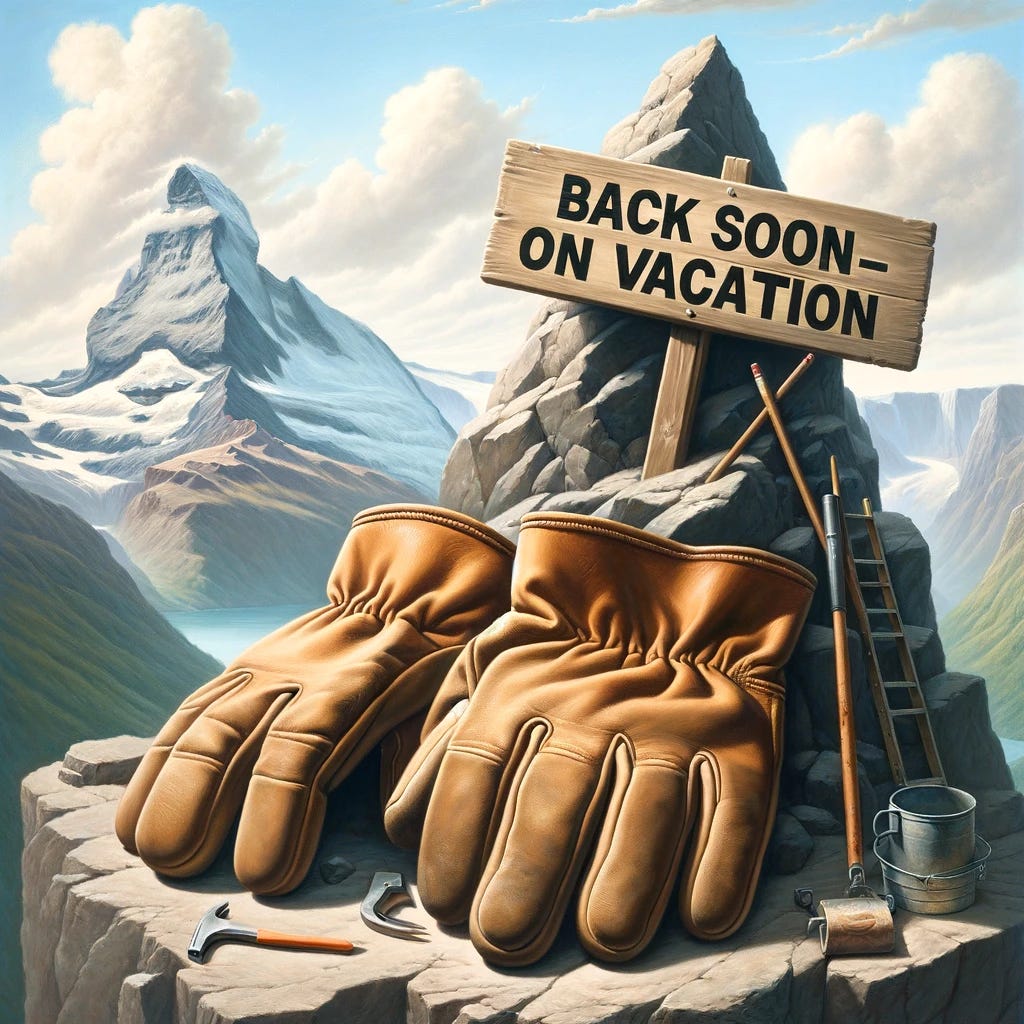
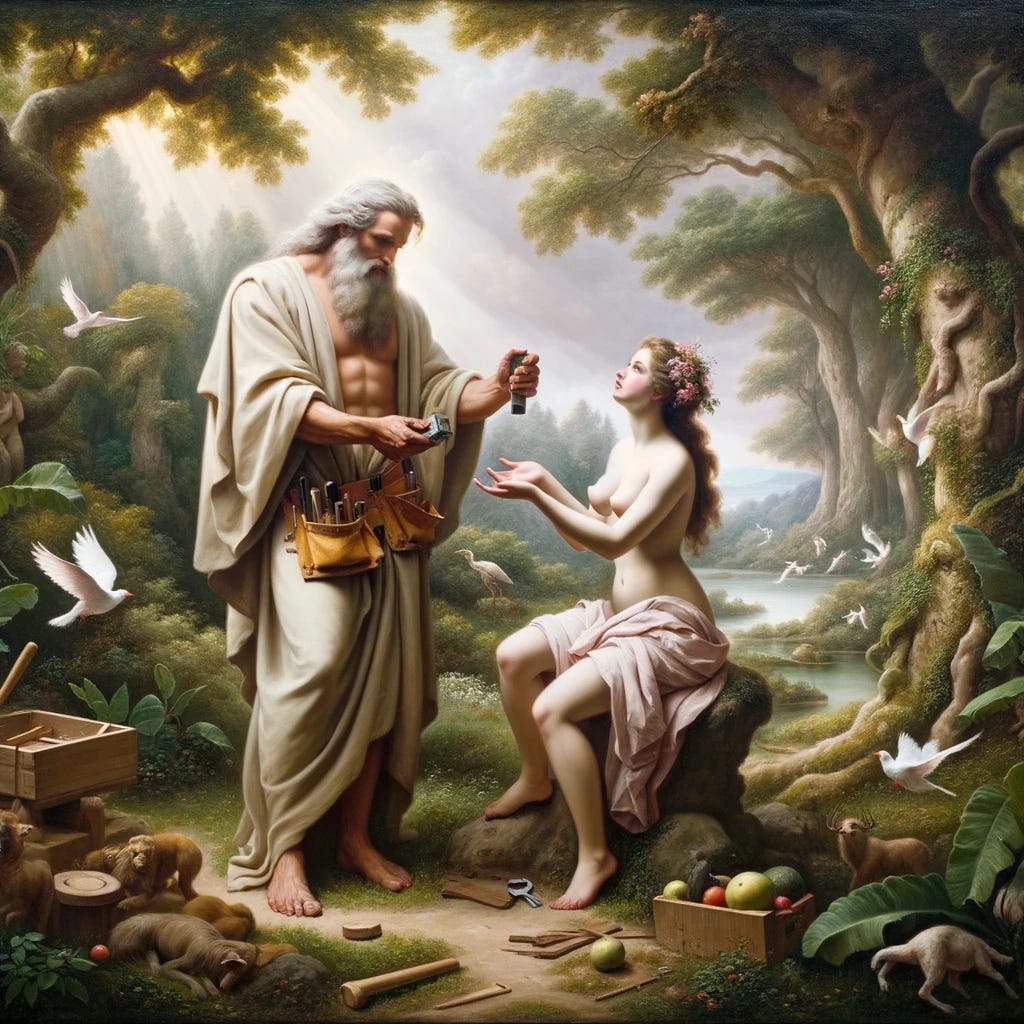


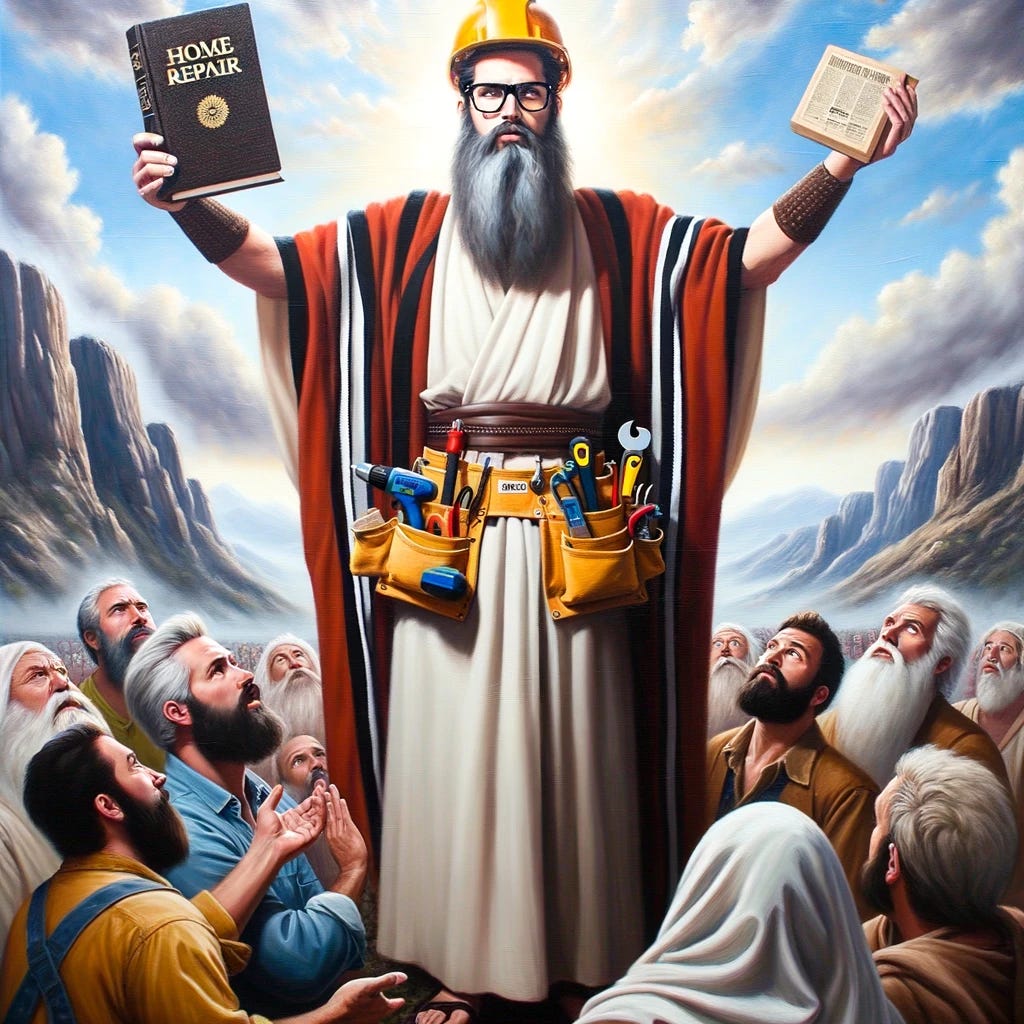



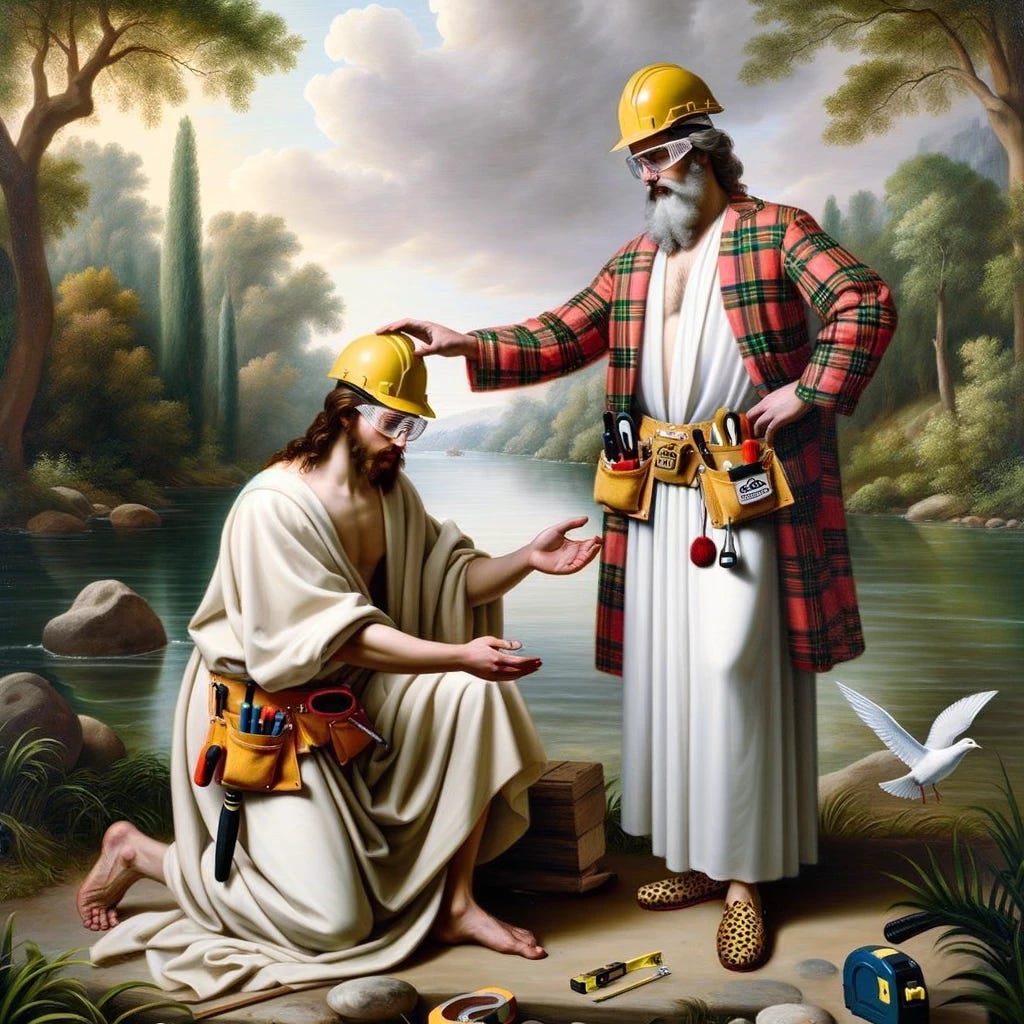


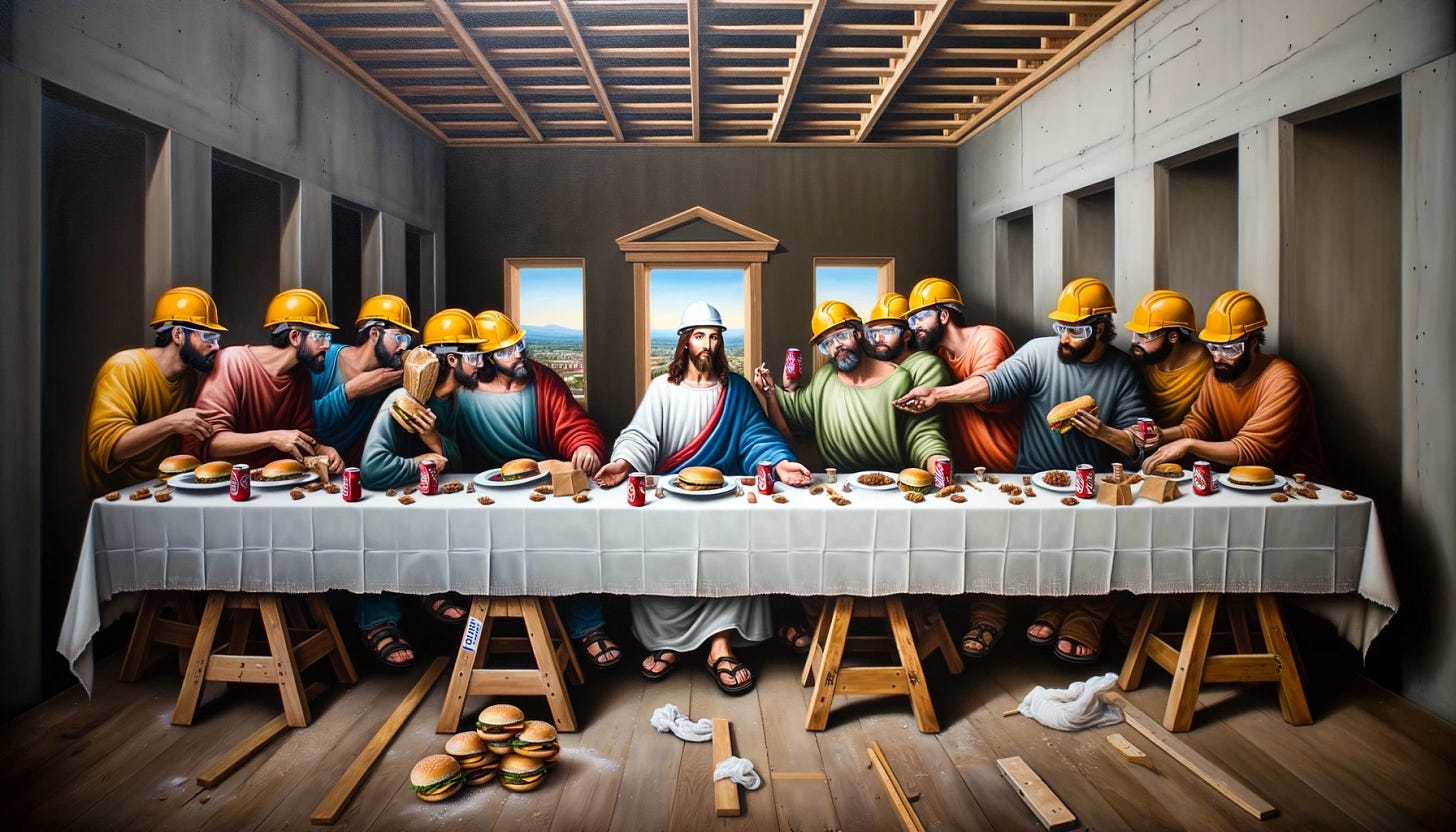

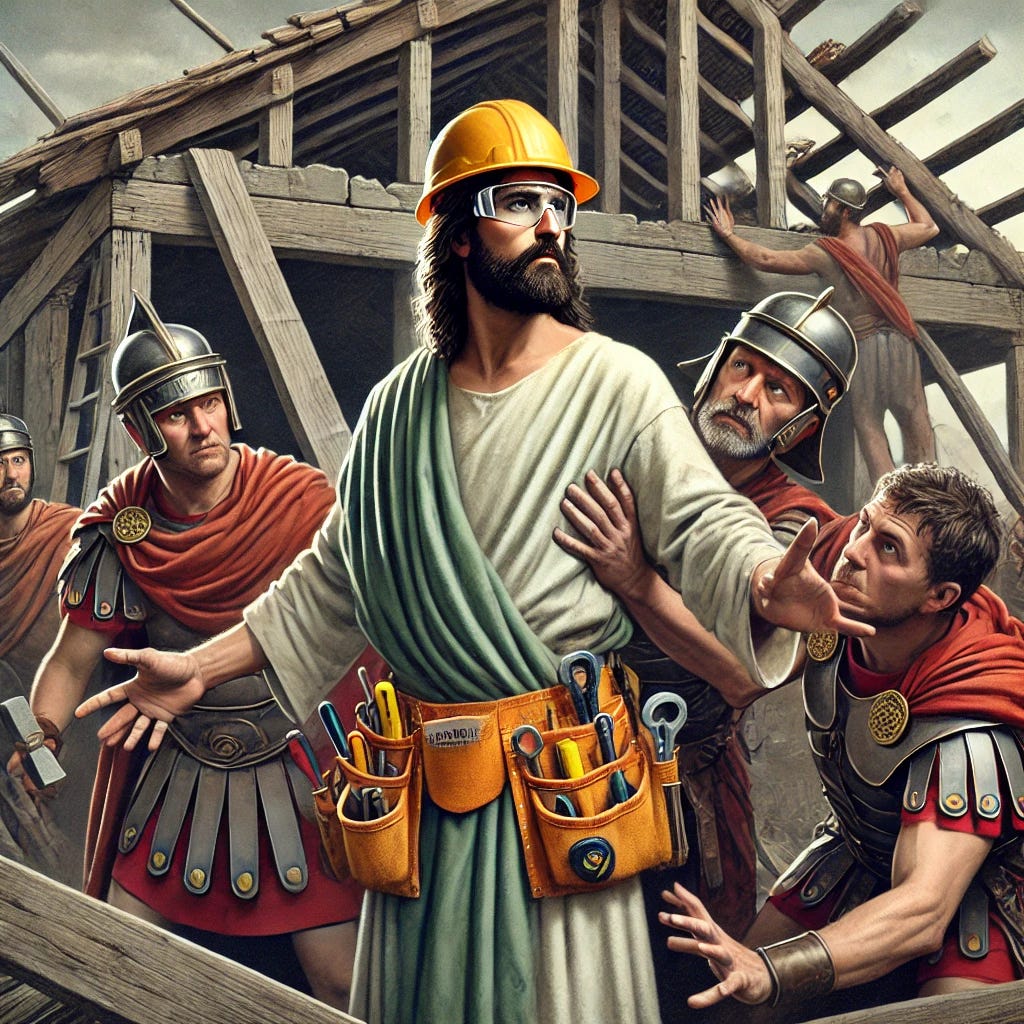






I loved every bit of this. And I would go so far as to say that even believing Christians are likely to spend part of their lives as cultural Christians. I’ve had times when I’ve had a deep and mystical relationship to my faith and there have been long stretches when I was showing up because showing up is what I do. There are seasons in faith like there are seasons in marriage, or parenthood, or any other part of life. There’s beauty in showing up even when your heart is not at that exact moment on fire with God’s love.
Brilliant, funny, and eminently thoughtful. Your writing is inspiring and important. Thank you for your hard work crafting such a wonderful article.